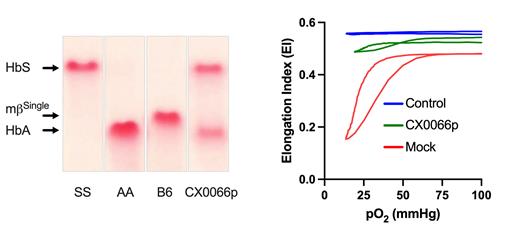Sickle cell disease (SCD) is a monogenic hemoglobin (Hgb) disorder characterized by a single pointmutation in the β-globin gene which causes Hgb polymerization under low oxygen tension and sickling of red blood cells (RBCs) which in turn drives severe systemic injury. Gene addition technologies like hematopoietic stem cell (HSC) targeted lentiviral (LV) gene therapy are among the most promising curative strategies for SCD. To expand this approach, improvements in LV titer, transduction efficiency, along with suppression of native sickle-globin, are preferred to generate successful therapeutic outcomes. One such improvement targets LV orientation: the relationship between the DNA encoding the β-globin gene in the LV and the promoter driving healthy β-globin gene expression. We created a forward-oriented β-globin-expression vector with an improved titer that results in more efficient transduction of human CD34+ cells in vitro, in human reconstituting CD34+ cells in xenografted mice, and in rhesus reconstituting CD34+ cells(Uchida N. et al., 2019).
We report here on further optimization of LVs that in addition to forward orientation, also express shRNA that decreases native β-globin and sickle-globin, which could enhance the assembly of corrected Hgb tetramers. Seven unique constructs which varied in anti-β-globin shRNA sequences, packaging elements, and regulatory elements, were transduced into MEL-BB88 cells and expanded for 2 weeks. gDNA was collected for vector copy number (VCN) analysis, and treated with 10 µM hemin to induce Hgb expression. Five days after hemin-induction, cells were harvested for benzidine staining and immunoblot analysis to validate globin expression. Sca-1+ HSC/progenitor (HSPC) BM cells were isolated from Towne's humanized SCD donor mice prior to stimulation for 48 h with cytokines, then transduced at an MOI of 24 twice, 24 h apart. To assess the in vivo engraftment potential of the transduced HSPCs, 2.5x10^6 cells were transplanted into lethally irradiated CD45.1 recipient mice. Peripheral blood (PB) was sampled at 2-week intervals for PBMC chimerism and lineage engraftment, Hgb electrophoresis, Lorrca OxygenScan and OsmoScan assays, and PB VCN. Whole BM from engrafted recipients was collected at 30 weeks and used for secondary transplantation assays which were again analyzed over 24 weeks for PB engraftment, VCN, and donor Hgb expression.
LVs were produced at varying titers and all successfully transduced MEL-BB88 cells with VCNs between 1 and 5 that were maintained following hemin induction. Interestingly, variations in RRE elements dramatically affected human globin expression in vitro. Furthermore, the transplanted mice engrafted fully with HSPCs transduced with multiple vectors. Notably, mice transplanted with HSPCs transduced with vector CX0066p (LCR-Enhancer-P-HBB-shmiR-3g1.223 + 3g2.30a-R1) maintained a VCN of 0.2-0.4 in PB for the 30-week duration of the primary transplant. Cellulose acetate gels of RBCs from PB showed ~40% HbA in a background of HbS. The P50 right-shifted towards normal, RBC counts increased, WBC counts decreased, and OxygenScan parameters were all corrected towards controls and away from those values obtained from mice transplanted with mock transduced HSPCs. EI max and EI min increased while pO2@95% decreased. Lastly, the RBC sickling was corrected in an in vitro sickling assay.
In conclusion, based on LV titer, MEL cell expression, transduction efficiency, engraftment of modified cells, in vivo globin expression, anti-sickling activity, and oxygen transport, these constructs provide outstanding Hgb expression and phenotype correction. Consequently, these candidates serve as a solid foundation for future human gene therapy products in the treatment of SCD.
Disclosures
Zhu:Miltenyi Biotec: Ended employment in the past 24 months. Dropulic:Vector BioMed: Current Employment. Orentas:Vector BioMed: Research Funding; Umoja Biopharma: Membership on an entity's Board of Directors or advisory committees; Galapagos NV: Membership on an entity's Board of Directors or advisory committees. Archer:Pfizer: Consultancy, Research Funding; Forma Therapeutics: Consultancy, Research Funding; DISC Medicine: Consultancy, Research Funding; Global Blood Therapeutics: Research Funding; Caring Cross: Research Funding.


This feature is available to Subscribers Only
Sign In or Create an Account Close Modal